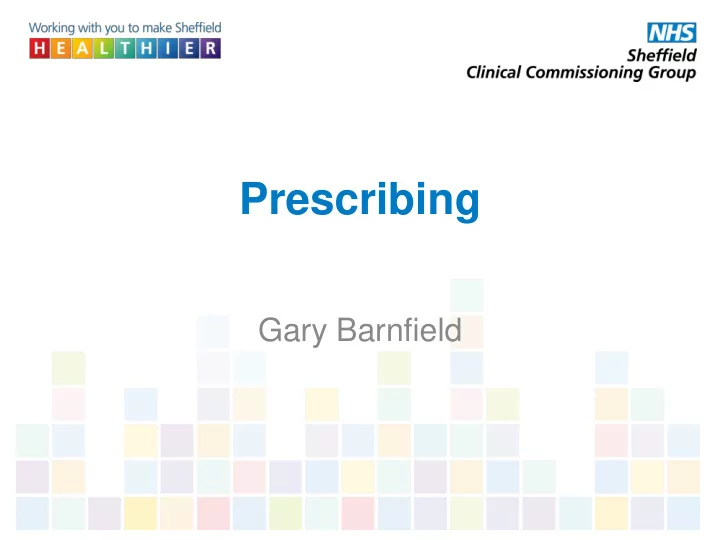

Prescribing Gary Barnfield
Pressures on the NHS and prescribing • We are all living longer - Two thirds of all the people who have ever lived past 65 in the entire history of the world are alive today! • We can now treat many diseases that in the past we could not • Many people are now living with multiple long term conditions • New drugs and therapies are increasingly expensive
Prescribing in Sheffield • Medicines are the most common therapeutic intervention • In Sheffield, we spend 13% of our budget on prescribing by GPs • This amounts to over £97 million spend this year • There are over 1 million prescriptions dispensed every month! • Like all areas across UK, seeing continual increase in prescribing and rapidly rising medicines costs • Makes it even more important that we use NHS resources as effectively as possible to care for all patients • Always looking at ways to improve quality and make sure we get the best value for patients from limited NHS resources.
Sheffield CCG • CCGs are responsible for paying for medicines that patients receive on prescription • We have a multidisciplinary medicines management team which includes pharmacists, pharmacy technicians, nurses and dietitians • Provide advice, guidelines and training on prescribing and the use of medicines • Help ensure GPs up to date with latest national guidance, monitoring requirements and how best to manage repeat prescribing systems.
Medicines Management Team Our mission is to ensure patients in Sheffield receive safe, clinically effective and cost efficient medicines in order to maximise the benefits that medicines can provide and result in the best possible patient outcomes.
Prescribing initiatives in Sheffield • Already taken some steps to bring down the cost of prescribing in Sheffield • Asked GPs to support some ‘common sense’ measures which don’t significantly impact on patient care. • Selecting the most cost effective option, where a less expensive medicine has been found to work equally well. • Not prescribing medicines that can be bought over the counter more cheaply e.g. paracetamol, which costs 4x more to the NHS than over the counter • Had 347,000 prescriptions for paracetamol issued last year in Sheffield costing the NHS £1.2 million • Not changing where used for long-term pain management but asking not to prescribe for short-term use
New prescribing guidelines Have produced guidelines on two areas: 1) Medicines that we do not recommend or support the prescribing of - a ‘STOP’ list 2) Prescribing generic rather than branded medicines
STOP list • Aiming to improve quality of prescribing, based on national guidance, and ensure best value for the NHS • Have produced a recommended ‘STOP’ list which comprises: Medicines where there is a lack of evidence to support their use or which are recognised as having limited clinical benefit, including medicines that NICE has advised not to prescribe. Medicines that offer poor value for money to the NHS and are considered not to be cost effective – may be alternative preparations that are more suitable. Medicines that are readily available over the counter, often at lower cost than to the NHS, encouraging self-care.
Generic Prescribing • Non-branded (generic) medicines usually significantly cheaper than branded • Zyprexa 20mg (28) £158.90 v olanzapine 20mg £3.96 • Not new approach – prescribing guidelines have advocated generic prescribing for some time • GPs mainly follow this but review of our prescribing shows still significant savings to be made if approach taken consistently. • Possibly down to some patients requesting specific brands or being unwilling to change to generic
Expected outcomes • Safer prescribing – some items on STOP list are known to have adverse effects • Currently spend c £3 million on drugs on the STOP list and around £300, 000 on brands that can be changed to generic • If we could manage to save even a proportion of this spend, it will help support further investment in primary care services for patients.
Informing patients • Will mainly focus on patients affected by these changes, through discussions with their GP • Providing information leaflets for GPs to give patients to explain the changes. • Pharmacist support - patients can also discuss with their pharmacist
Questions
Over to you • Have you had any feedback from patients in your practice on prescribing? • Do you think patients should be able to choose the brand of medication they are prescribed? • What role do you think patients have in getting the best value from NHS resources?
Recommend
More recommend